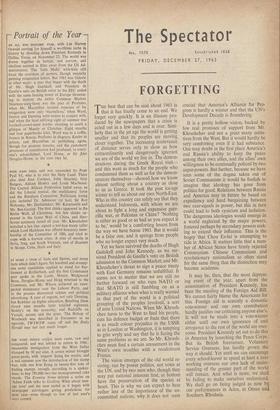FORGETTING
THE best that can be said about 1963 is that it has finally come to an end. We forget very quickly. It is an illusion pro- duced by the newspapers that a crisis is acted out in a few days and is over. Simi- larly that in the jet age the world is getting smaller and that its peoples are moving, closer together. The increasing irrelevance of distance serves only to show us how extraordinarily and dangerously ignorant we are of the world we live in. The demon- strations during the Greek Royal visit— and this went as much for the people who condemned them as well as for the demon- strators themselves—showed how we know almost nothing about a country as close to us as Greece. It took the past ice-age winter to tell us about our own North-East. Who in this country can safely say that they understand Indonesia, with whom we are about to fight a long and expensive guer- rilla war, or Pakistan or China? 'Nothing is either as good or as bad as you expect it to be,' would be a comforting lesson from the way we have borne 1963. But it would be a false one, and it springs from people who no longer expect very much.
Yet we have survived the deaths of Hugh Gaitskell and John Kennedy, as we sur- vived President de, Gaulle's veto on British admission to the Cbmmon Market; and Mr. Khrushchev's threat to sign a peace treaty with East Germany remains unfulfilled. It seems not to matter that we are still no further forward on who runs NATO or that SEATO is still fumbling on as a military alliance when what is really wanted in that part of the world is a political grouping of the peoples involved, a sort of area United Nations. When Mr. Khrush- chev turns to the West to feed his people, cuts his defence budget or finds that there is as much colour prejudice in the USSR as in London or Washington, it is tempting to grin wryly and say that he is facing the same problems as we are. So Mr. Khrush- chev must find a certain amusement in the West's own troubles with a recalcitrant France.
The vision emerges of the old world re- viving, run by power politics, not votes at the UN, and by two men who, though they may put national interests first, at bottom have the preservation of the species at heart. This is why we can expect to hear rather less of the importance of the un- committed nations, why it does not wern crucial that America's Alliance for Pro- gress is hardly a winner and that the UN's Development Decade is floundering.
It is a pretty hollow 'vision, backed by few real promises of support from Mr. Khrushchev and not a great many initia- tives from the West. But it would hardly be very comforting even if it had substance. One may doubt in the first place America's and Russia's ability to keep the peace among their own allies, and the allies' own willingness to be continually policed by two super-powers. But further, because we have seen some of the dogma taken out of Soviet Communism it would be foolish to imagine that ideology has gone from politics for good. Relations between Russia and America may in future be based on expediency and hard bargaining between two near-equals in power, but this in turn could lead to both cynicism and isolation. The dangerous ideologies would emerge in a world neglected by the major powers, fostered perhaps by secondary powers seek- ing to extend their influence. This is the bogey 'that Chou En-lai is attempting to ride in Africa. It matters little that a num- ber of African States have firmly rejected Communism. Chinese Communism and revolutionary nationalism so often 'stand for the same thing that the distinction may become academic.
It may be, then, that the most depress- ing event of the year, apart from the assassination of President Kennedy, has been the mauling of the Foreign Aid Bill. We cannot fairly blame the Americans for this. Foreign aid is scarcely a domestic vote-winner and our own contribution hardly justifies our criticising anyone else's. It will not be made into a vote-winner either until our own ignorance of and arrogance to the rest of the world are over- come. President Kennedy set out to do this in, America by launching the Peace Corps. But its British forerunner, Voluntary Service Overseas, has hardly grown the way it should. Yet until we can encourage every school-leaver to spend at least a year working overseas our own lack of under- standing of the greater part of the world will remain. And what is more, we shall be failing to make ourselves understood. We shall go on being judged as now by our performances in Aden, in Oman and Southern Rhodesia.






























 Previous page
Previous page